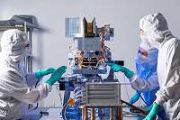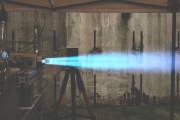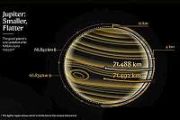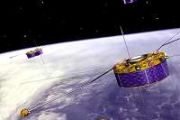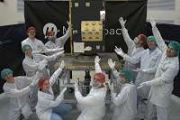
Copernical Team
New spin on space research
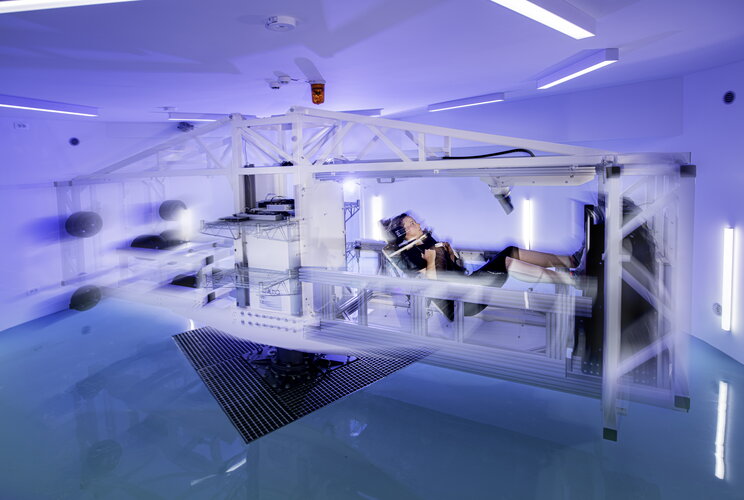 Image:
Image:
The ESA-owned Short Arm Human Centrifuge has been upgraded, installed and inaugurated at the Olympic Sport Centre Planica facility near Kranjska Gora, Slovenia. Soon to be home to ESA bedrest studies, this recently enhanced clinical research centre will help further scientists’ knowledge of human physiology in space.
Run by the Jozef Stefan Institute on behalf of ESA, bedrest studies at the facility offer scientists a way to see how the human body adapts to weightlessness. This allows researchers to test techniques, known as “countermeasures”, to counteract the negative effects of living in space.
The Short-Arm Human Centrifuge offers an
UAE to launch probe targeting asteroid between Mars, Jupiter

The United Arab Emirates on Tuesday announced plans to send a probe to land on an asteroid between Mars and Jupiter to collect data on the origins of the universe, the latest project in the oil-rich federation's ambitious space program.
The project targets a 2028 launch with a landing in 2033, a five-year journey in which the spacecraft will travel some 3.6 billion kilometers (2.2 billion miles).
The UAE's Space Agency said it will partner with the Laboratory for Atmospheric Science and Physics at the University of Colorado on the project. It declined to immediately offer a cost for the effort.
The project comes after the Emirates successfully put its Amal, or "Hope," probe in orbit around Mars in February. The car-size Amal cost $200 million to build and launch. That excludes operating costs at Mars.
The Emirates plans to send an unmanned spacecraft to the moon in 2024. The country, which is home to Abu Dhabi and Dubai, also has set the ambitious goal to build a human colony on Mars by 2117.
Explore further
Sounding rocket mission to offer snapshot of sun's magnetic field
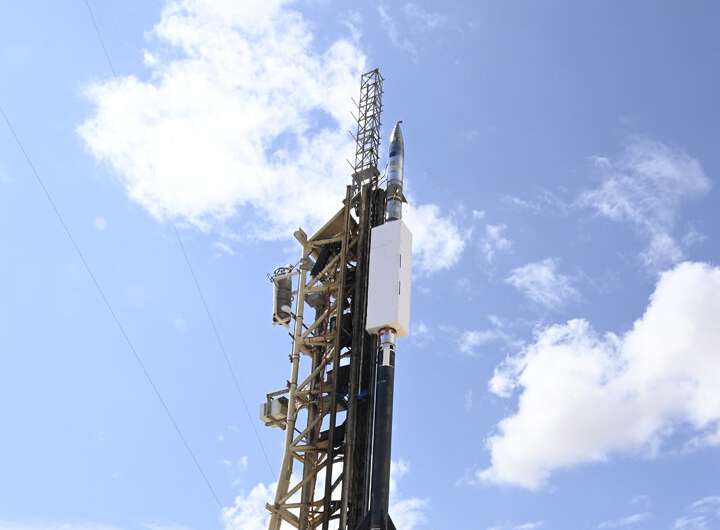
Measuring a magnetic field isn't so hard if you're inside of it. Measuring a magnetic field remotely—whether from across a room, across a country, or 93 million miles away—is an entirely different story. But that's exactly what a team of NASA scientists and international collaborators aim to do with the CLASP2.1 mission: measure the magnetic field in a critical slice of the sun's atmosphere called the chromosphere.
CLASP2.1, short for Chromospheric Layer Spectropolarimeter 2.1, will make these measurements from a NASA sounding rocket. Sounding rockets are small rockets that carry instruments into space for five to ten minutes before falling back down to Earth. The launch window for the CLASP2.1 sounding rocket mission opens at 11:30 a.m. MT on Oct. 5, 2021, at the White Sands Missile Range in New Mexico.
The upcoming flight will be the CLASP instrument's third trip to space.
NASA issues contracts to mature electrified aircraft propulsion technologies
 NASA has selected two U.S. companies to support its Electric Powertrain Flight Demonstration (EPFD) that will rapidly mature Electrified Aircraft Propulsion (EAP) technologies through ground and flight demonstrations.
Through the EPFD program, NASA seeks to introduce EAP technologies to U.S. aviation fleets no later than 2035, supporting short-range and regional commercial air travel, as w
NASA has selected two U.S. companies to support its Electric Powertrain Flight Demonstration (EPFD) that will rapidly mature Electrified Aircraft Propulsion (EAP) technologies through ground and flight demonstrations.
Through the EPFD program, NASA seeks to introduce EAP technologies to U.S. aviation fleets no later than 2035, supporting short-range and regional commercial air travel, as w Aerojet Rocketdyne completes Space Launch System rocket engine test series
 The latest RS-25 engine test at NASA's Stennis Space Center completed the Retrofit-2 test series, which validated modernized, lower-cost components for new RS-25 engines to be used on the Space Launch System (SLS) heavy-lift rocket.
RS-25 development test engine No. 0528 completed a full duration firing of 500 seconds and reached 109% of its originally designed Space Shuttle Main Engine po
The latest RS-25 engine test at NASA's Stennis Space Center completed the Retrofit-2 test series, which validated modernized, lower-cost components for new RS-25 engines to be used on the Space Launch System (SLS) heavy-lift rocket.
RS-25 development test engine No. 0528 completed a full duration firing of 500 seconds and reached 109% of its originally designed Space Shuttle Main Engine po Arianespace to launch GSAT-24 satellite for NSIL with Ariane 5
 On September 28, 2021, NewSpace India Limited (NSIL) entrusted Arianespace with the launch of its GSAT-24 telecommunications satellite. GSAT-24 is scheduled for launch in the 1st quarter of 2022, from the Guiana Space Center, Europe's Spaceport in Kourou, French Guiana, on one of the seven Ariane 5 missions remaining to be performed with the heavy-lift launcher.
This Ku-band satellite is a
On September 28, 2021, NewSpace India Limited (NSIL) entrusted Arianespace with the launch of its GSAT-24 telecommunications satellite. GSAT-24 is scheduled for launch in the 1st quarter of 2022, from the Guiana Space Center, Europe's Spaceport in Kourou, French Guiana, on one of the seven Ariane 5 missions remaining to be performed with the heavy-lift launcher.
This Ku-band satellite is a Zeroing in on the origins of Earth's "single most important evolutionary innovation"
 Some time in Earth's early history, the planet took a turn toward habitability when a group of enterprising microbes known as cyanobacteria evolved oxygenic photosynthesis - the ability to turn light and water into energy, releasing oxygen in the process.
This evolutionary moment made it possible for oxygen to eventually accumulate in the atmosphere and oceans, setting off a domino effect
Some time in Earth's early history, the planet took a turn toward habitability when a group of enterprising microbes known as cyanobacteria evolved oxygenic photosynthesis - the ability to turn light and water into energy, releasing oxygen in the process.
This evolutionary moment made it possible for oxygen to eventually accumulate in the atmosphere and oceans, setting off a domino effect Space Force selects more than 900 personnel to transfer FY22
 The Space Force, working with the Army, Navy and Marine Corps, has selected 670 active-duty service members and 259 civilians to transfer into the Space Force during fiscal year 2022. These volunteers come from the pool of candidates who applied in March 2021 and members who are currently assigned to Army and Navy units slated to transfer into the new service.
These new selects join the in
The Space Force, working with the Army, Navy and Marine Corps, has selected 670 active-duty service members and 259 civilians to transfer into the Space Force during fiscal year 2022. These volunteers come from the pool of candidates who applied in March 2021 and members who are currently assigned to Army and Navy units slated to transfer into the new service.
These new selects join the in GomSpace signs a contract with SpaceAble to enhance the sustainability of Low Earth Orbit
 GomSpace signs a contract with SpaceAble to enhance the sustainability of Low Earth Orbit
GomSpace enters into an agreement with SpaceAble, to enhance the sustainability of Low Earth Orbit (LEO). The contract is worth 21MSEK (US$2.4M) and the project will begin in 2021 with expected delivery in late 2023.
The mission is designed to enhance the sustainability of LEO. By tracking the i
GomSpace signs a contract with SpaceAble to enhance the sustainability of Low Earth Orbit
GomSpace enters into an agreement with SpaceAble, to enhance the sustainability of Low Earth Orbit (LEO). The contract is worth 21MSEK (US$2.4M) and the project will begin in 2021 with expected delivery in late 2023.
The mission is designed to enhance the sustainability of LEO. By tracking the i New small satellite platform debuts
 China is offering a small communication satellite platform to countries seeking an affordable solution for their own space-based internet networks.
The DFH-3E satellite platform was designed by the China Academy of Space Technology, a subsidiary of the State-owned space conglomerate, China Aerospace Science and Technology Corp. It is the country's first small satellite platform designed fo
China is offering a small communication satellite platform to countries seeking an affordable solution for their own space-based internet networks.
The DFH-3E satellite platform was designed by the China Academy of Space Technology, a subsidiary of the State-owned space conglomerate, China Aerospace Science and Technology Corp. It is the country's first small satellite platform designed fo 





